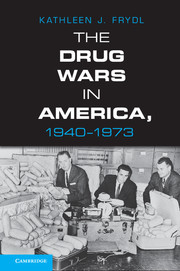Description
The Drug Wars in America, 1940–1973
Author: Frydl Kathleen J.
Examines how and why the US government went from regulating illicit drug traffic and consumption to declaring war on both.
Language: English
Subject for The Drug Wars in America, 1940–1973:
Approximative price 76.42 €
In Print (Delivery period: 14 days).
Add to cart
The Drug Wars in America, 1940-1973
Publication date: 04-2013
Support: Print on demand
Publication date: 04-2013
Support: Print on demand
Approximative price 36.76 €
In Print (Delivery period: 14 days).
Add to cart
The Drug Wars in America, 1940-1973
Publication date: 04-2013
Support: Print on demand
Publication date: 04-2013
Support: Print on demand
Description
/li>Contents
/li>Biography
/li>
The Drug Wars in America, 1940?1973 argues that the US government has clung to its militant drug war, despite its obvious failures, because effective control of illicit traffic and consumption were never the critical factors motivating its adoption in the first place. Instead, Kathleen J. Frydl shows that the shift from regulating illicit drugs through taxes and tariffs to criminalizing the drug trade developed from, and was marked by, other dilemmas of governance in an age of vastly expanding state power. Most believe the 'drug war' was inaugurated by President Richard Nixon's declaration of a war on drugs in 1971, but in fact his announcement heralded changes that had taken place in the two decades prior. Frydl examines this critical interval of time between regulation and prohibition, demonstrating that the war on drugs advanced certain state agendas, such as policing inner cities or exercising power abroad.
Part I. 1940–60: Preface; Introduction; 1. Trade in war; 2. Presumptions and pretense: international trade in narcotics; 3. 'A society which requires some sort of sedation': domestic drug consumption, circulation, and perception; Part II. 1960–73: 4. Review and reform: the Kennedy commission; 5. Police and clinics: enforcement and treatment in the city, 1960–73; 6. The cost of denial: Vietnam and the global diversity of the drug trade; Conclusion: war on trade.
Kathleen J. Frydl is the author of The G.I. Bill (Cambridge University Press, 2009), which won the 2010 Louis Brownlow Book Award from the National Academy of Public Administration. She received a fellowship from the Woodrow Wilson Center to support her research for this book.
© 2024 LAVOISIER S.A.S.

